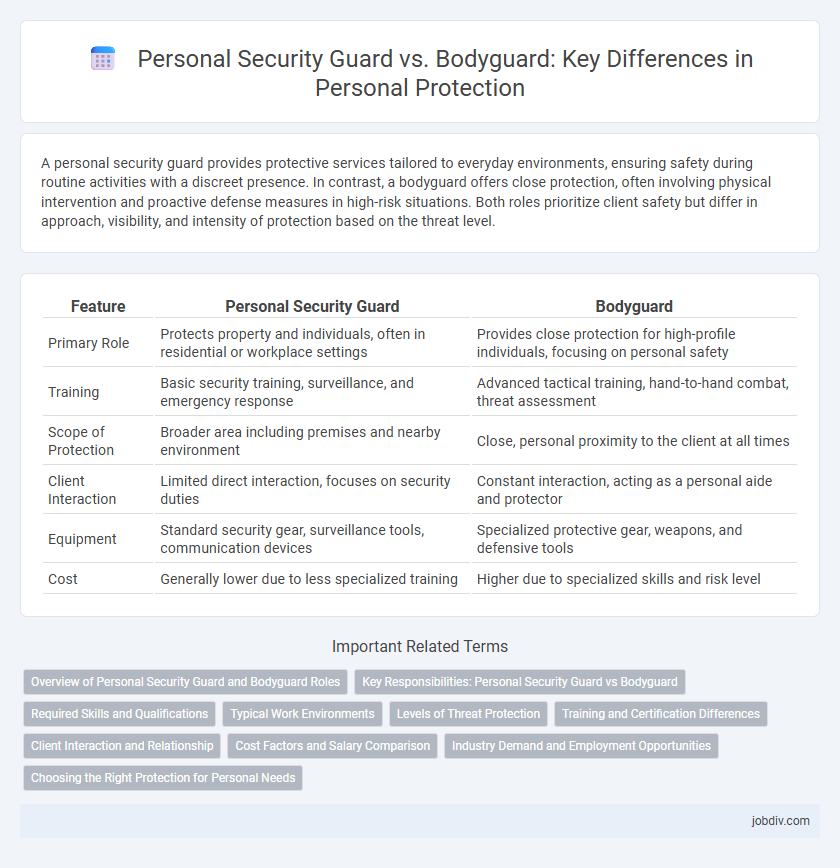A personal security guard provides protective services tailored to everyday environments, ensuring safety during routine activities with a discreet presence. In contrast, a bodyguard offers close protection, often involving physical intervention and proactive defense measures in high-risk situations. Both roles prioritize client safety but differ in approach, visibility, and intensity of protection based on the threat level.
Table of Comparison
| Feature | Personal Security Guard | Bodyguard |
|---|---|---|
| Primary Role | Protects property and individuals, often in residential or workplace settings | Provides close protection for high-profile individuals, focusing on personal safety |
| Training | Basic security training, surveillance, and emergency response | Advanced tactical training, hand-to-hand combat, threat assessment |
| Scope of Protection | Broader area including premises and nearby environment | Close, personal proximity to the client at all times |
| Client Interaction | Limited direct interaction, focuses on security duties | Constant interaction, acting as a personal aide and protector |
| Equipment | Standard security gear, surveillance tools, communication devices | Specialized protective gear, weapons, and defensive tools |
| Cost | Generally lower due to less specialized training | Higher due to specialized skills and risk level |
Overview of Personal Security Guard and Bodyguard Roles
Personal security guards and bodyguards both provide protection, but their roles differ in scope and environment. Personal security guards typically safeguard properties, events, or designated areas by monitoring and controlling access, while bodyguards specialize in close protection of individuals, focusing on preventing physical threats. Both roles require vigilance, risk assessment, and rapid response skills to ensure safety and security.
Key Responsibilities: Personal Security Guard vs Bodyguard
Personal security guards primarily focus on securing a specific location or event, ensuring safety through access control, surveillance, and risk assessment. Bodyguards provide close protection, specializing in personal escort, threat detection, and immediate response to physical threats targeting an individual. Both roles demand vigilance, but bodyguards require advanced tactical training to manage direct confrontations and protect high-profile clients.
Required Skills and Qualifications
Personal security guards require strong observational skills, effective communication, and basic first aid knowledge, often holding certifications in security training and state-specific licensing. Bodyguards must possess advanced combat training, threat assessment abilities, and specialized skills in close protection, frequently backed by military or law enforcement experience. Both roles demand physical fitness, situational awareness, and the ability to remain calm under pressure to ensure client safety.
Typical Work Environments
Personal security guards typically operate in fixed locations such as residential properties, corporate offices, or retail stores, providing stationary protection and monitoring access points. Bodyguards work in dynamic settings, escorting clients through various environments including public events, private functions, and travel routes to ensure continuous personal safety. Both roles require situational awareness and risk assessment but differ in their operational scope and mobility demands.
Levels of Threat Protection
Personal security guards provide a broad level of threat protection, focusing on monitoring environments and deterring potential risks through constant vigilance and access control. Bodyguards offer a higher, more specialized level of protection, trained to respond swiftly to immediate physical threats, including close-quarter defense and emergency evacuation. The choice between a personal security guard and a bodyguard depends on the assessed level of threat and the specific security needs of the individual.
Training and Certification Differences
Personal security guards typically undergo basic training in surveillance, emergency response, and conflict de-escalation, often obtaining certifications from accredited security programs. Bodyguards receive specialized training that includes advanced defensive tactics, firearms proficiency, close protection techniques, and risk assessment, frequently requiring certification through recognized executive protection courses. The certification standards for bodyguards tend to be more rigorous and specific due to the higher level of personal risk and responsibility involved in protecting VIPs.
Client Interaction and Relationship
A personal security guard maintains professional boundaries while ensuring client safety through constant vigilance and risk assessment, fostering trust based on reliability and discretion. A bodyguard often develops a closer, more personalized rapport by anticipating client needs and adapting protection strategies accordingly, enhancing a sense of personal connection. Both roles prioritize effective communication and situational awareness to build strong, secure interactions with clients.
Cost Factors and Salary Comparison
Personal security guards typically have lower cost factors compared to bodyguards due to less specialized training and fewer responsibilities. The average salary for a personal security guard ranges from $30,000 to $50,000 annually, while bodyguards often earn between $60,000 and $120,000 depending on experience and client risk level. Factors such as certification, client profile, and assignment complexity significantly influence the salary disparity between these two roles.
Industry Demand and Employment Opportunities
The industry demand for personal security guards is driven by a wide range of clients seeking protection in residential, corporate, and event settings, resulting in diverse employment opportunities. Bodyguards, specializing in close protection for high-profile individuals such as celebrities, executives, and politicians, face a more niche but highly competitive job market. Both roles offer growth potential in sectors like private security firms, government agencies, and luxury services, but personal security guards generally encounter broader demand across multiple industries.
Choosing the Right Protection for Personal Needs
Personal security guards provide comprehensive protection, including threat assessment, secure transportation, and risk management, tailored to individual lifestyles and environments. Bodyguards specialize in close physical protection, often trained to respond swiftly to immediate threats and ensure personal safety during high-risk situations. Selecting the right protection depends on evaluating specific security needs, lifestyle risks, and the level of threat exposure to ensure optimal personal safety.
Personal Security Guard vs Bodyguard Infographic

 jobdiv.com
jobdiv.com